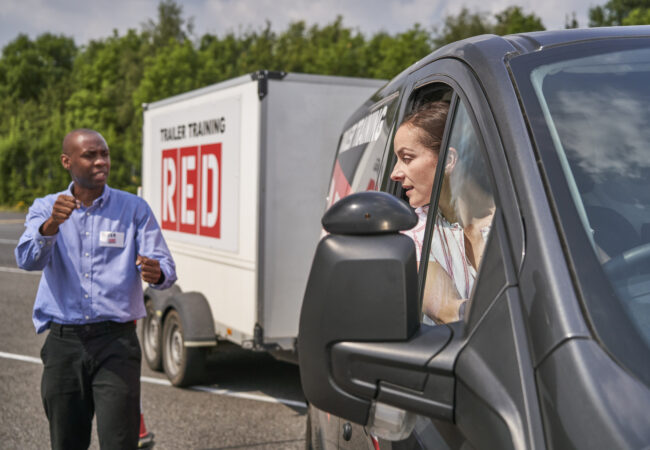The primary aim is to prepare drivers for the B+E DVLA test enabling them to tow trailers however the course will also equip drivers with the tools that will assist them in making the most appropriate judgements and employ safe working practices whilst towing trailers, particularly with regards to confined space manouevring and in with regards to pre and post towing checks, whilst at work.
To facilitate an enjoyable, practical and interactive learning environment. To develop sound planning and decision making skills throughout the processes of coupling and uncoupling, RED012a Trailer Towing Training B+E and operating specific pieces of equipment.
RED Training Centre, Donington Park, DE74 2RP
1:1 or 2:1 basis
Minimum 2 x full days (+ test day)

Trainer and driver will carry out vehicle, licence and eyesight checks (note: if, in the opinion of the trainer, the ‘failing’ of any of these checks precludes the continuance of the course, the trainer will reserve the right to terminate training at this point).
The trainer will give provide demonstration drives throughout the training days in order to illustrate the benefits and application of the Three Principles of Safe Driving.
The coaching session will develop the perceptual skills outlined in the presentation and provide opportunities to explore the principles of keeping space, identifying risk and keeping visible and communicating with other road users.
As many road types as possible will be visited during the session, with emphasis being placed on high risk environments as well as any specific ones identified by the driver as being of personal concern.
The trainer will help the driver identify weight plates, limits and restrictions of the trailer being used for the training. These will also be cross-referenced with the towing capabilities of the vehicle to be used, with the purpose of establishing:
Particular attention will be paid to the safe and even distribution of trailer loads, with the purpose of establishing:
RED012a Trailer Towing Training B+E
The importance of maintaining the optimum nose weight will be covered indetail. A systemic and safe system of coupling and uncoupling will be introduced and practiced by the driver. Pre-journey safety checks and the appropriate checks to be made soon after the start of a journey to establish any initial movement or settling of the load, will be covered.
Practical confined space and manoeuvring exercises will be covered, as space and time permit, at the training location or in other accessible and appropriate areas. The key learning points will be:
All drivers that are required to tow a trailer whilst driving at work and do not currently have B+E on their licence and are required to pass the DVLA test for this.
The actual DVSA test will need to be arranged and the RED bookings team can assist with this process via its online booking portal. This test will be arranged on the day after the training or as close to this as is available.
RED can also provide the tow vehicle for this training if required and a suitable trailer that meets with the DVSA requirements, including the proscribed load.
If you wish to provide the above vehicle and trailer, then please ensure that you meet the requirements as laid out in (see appendix A).
Please also be note that an ‘off road’ area for the specific manouevring/reversing training will also be required where this training does not take place from our Training Centre.